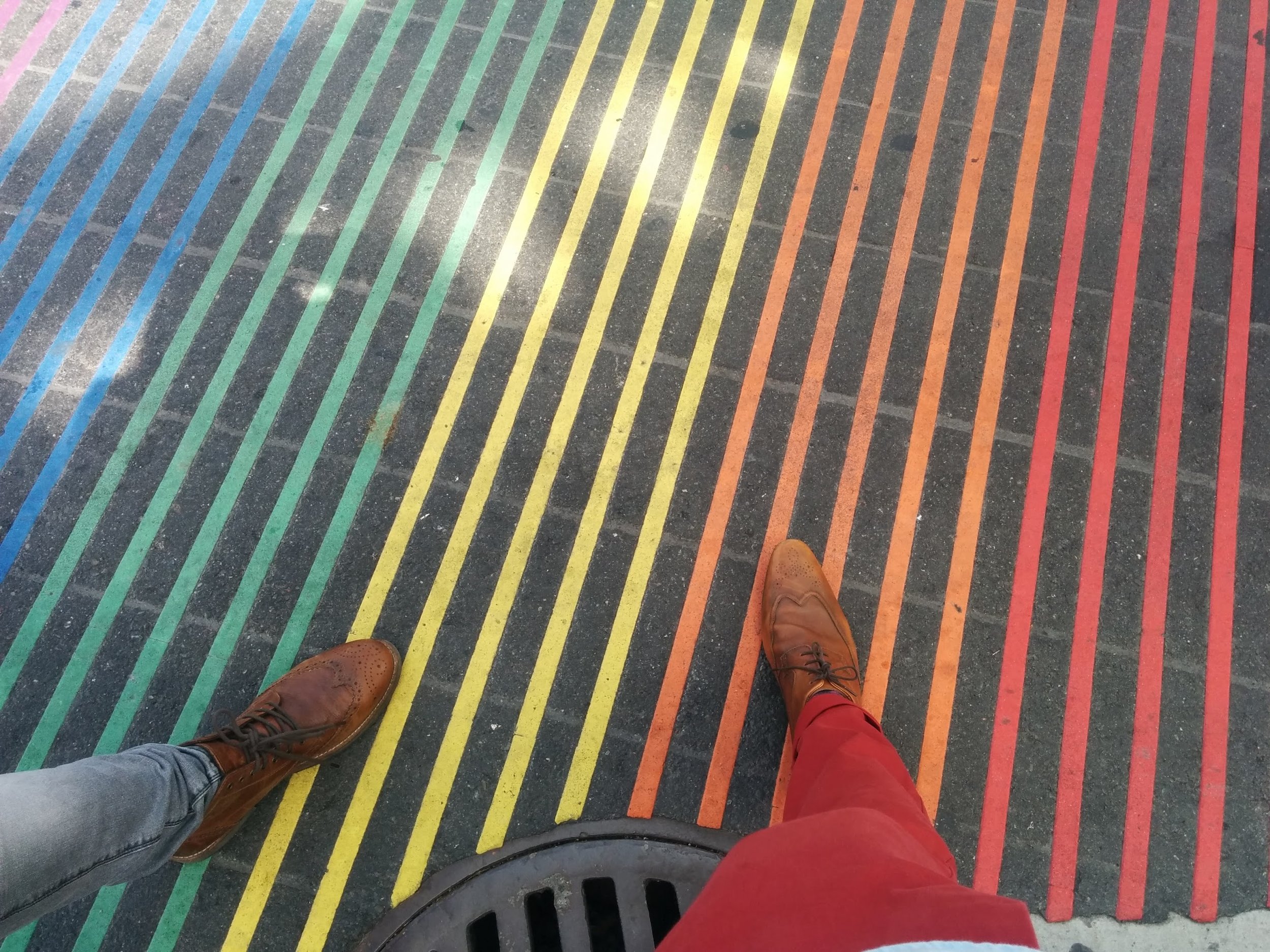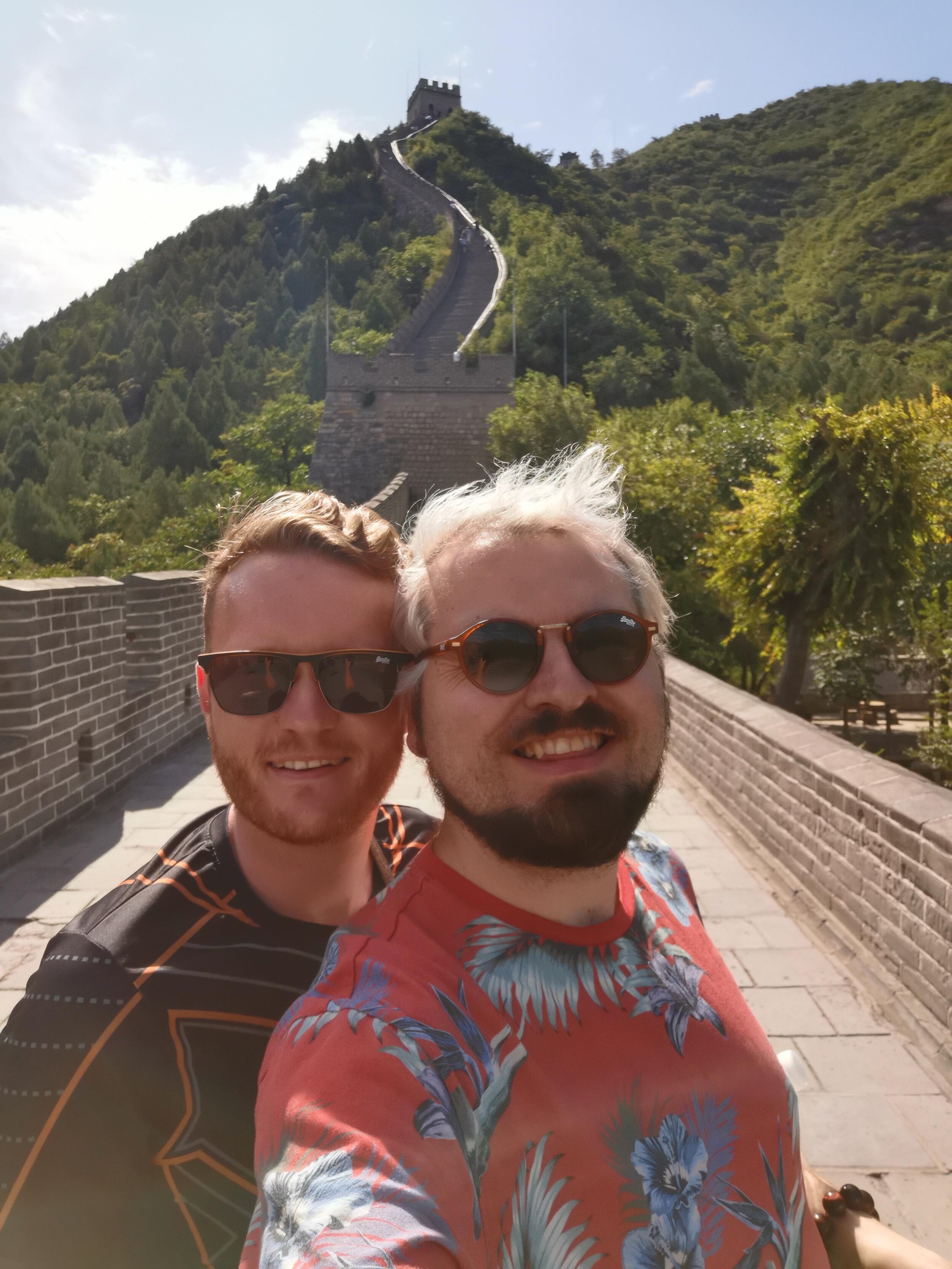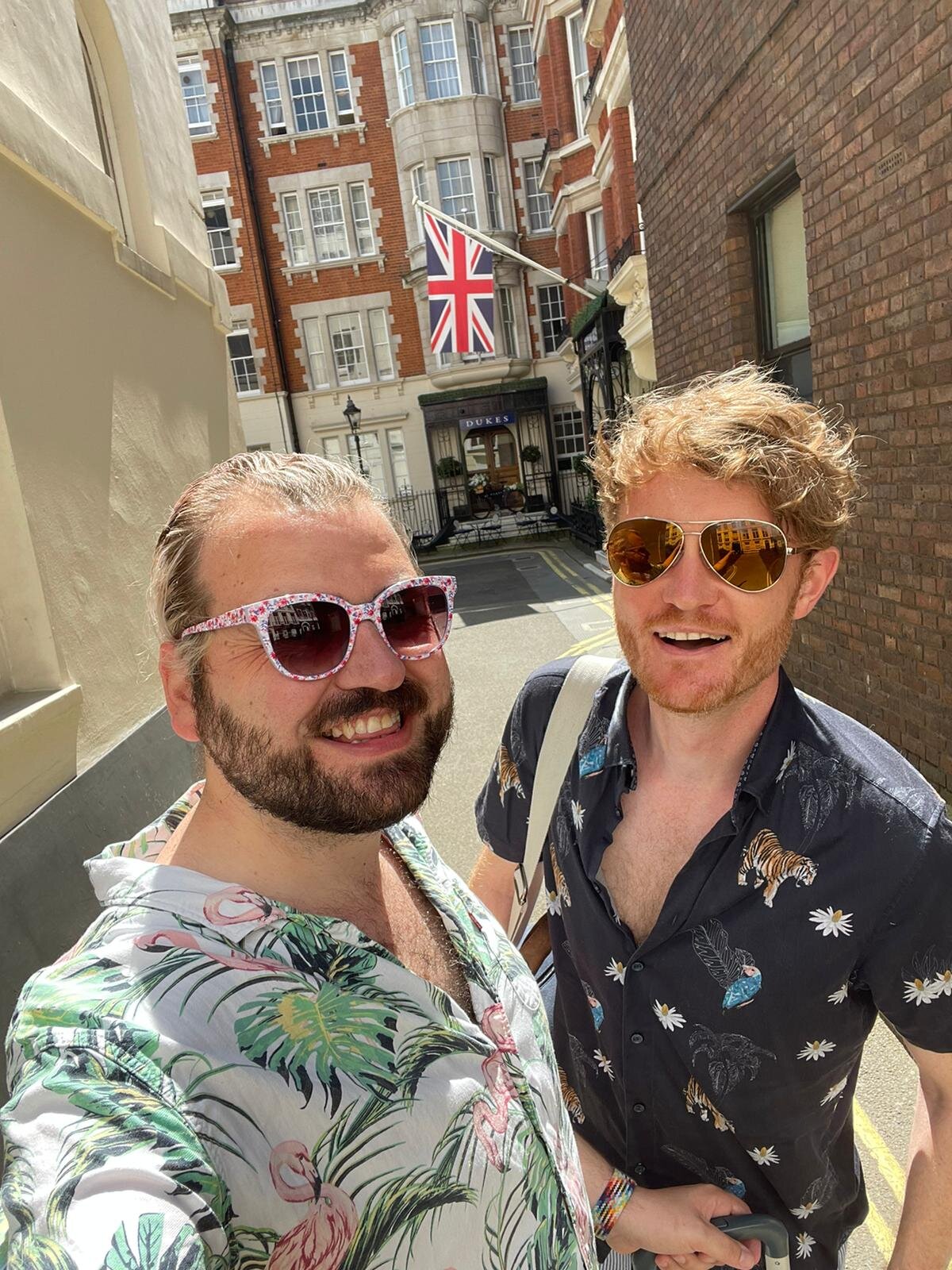Serving realness in Russia (and other homophobic destinations)

This week’s reports of homophobic attacks on football fans at the World Cup in Russia, the arrest of Peter Tatchell and LGBT supporters being advised by the Foreign Office to not “show affection” to their partners have made me reflect on all those times my husband Antony and I have had to hide who we are on holiday – and why I will never do so again.
As a gay couple, you’re used to receiving your fair share of funny looks – both at home and abroad. It can even begin when you check in. “Twin beds or [pause] a double?” This is normal for us. We take it in turns to be Mrs Lowbridge-Ellis because (allegedly) their booking system doesn’t allow them to enter Mr and Mr. It bothers me when their computer does not compute, and we’ve received several grovelling apologies from people who may have just been using this as an excuse. It’s arguably worse when they’ve just made the heteronormative assumption that all couples are one man and one woman.
I get it – we’re a minority. The world doesn’t revolve around us: a big chunk of it doesn’t in fact.
It’s still illegal to be gay in over 70 countries. And many of those where there are no laws reinforcing inequality are pretty hostile. Russia is one of those places. I didn’t even realise until this week that homosexuality isn’t illegal there. But there are no laws to prohibit discrimination and ‘promotion’ is definitely illegal. By law, gay pride has been banned for 100 years.
Tyrants have always found it politically expedient to ostracise minorities. Here in Britain, Henry the Eighth is the one responsible for making buggery illegal. He didn’t especially dislike gay people – he just needed a way to accuse and execute more Catholics. Vladimir Putin is merely the latest in a very long line of leaders taking a public stance on queers so he can maintain his grip on power.
It’s more than a little solipsistic for me to write an article (this one) that essentially argues ‘homophobia makes it difficult for my husband and I to go on holiday in Russia'. I do not intend to diminish how horrendous it must be for the millions of queer people living in Russia. I dread to think what it must be like growing up gay in Russia today. I doubt very much that Russian school children learn about the private lives of their most famous creative superstars. Famous queer Russians abound: Eisenstein (pretty much invented modern movie editing), Diaghliev (ballet supremo), Tchaikovsky (Swan Lake, The Nutcracker, the 1812 overture, the theme to The Apprentice...). Next to this, the concerns of a couple of potential tourists pale by comparison.
Nevertheless, above our desk at home we have a map marked with the places we want to visit in our lifetimes. Russia is one of them. But there is absolutely no way I would entertain visiting Russia right now. Yes, Antony and I would probably be perfectly safe in our hotel and, as long as we didn’t “show affection”, elsewhere as well. As it happens, we once had a connecting flight through Moscow on the way to Tokyo and had a lovely couple of hours, safe in our airport bubble. Being in a bubble is not what I want to experience for an entire holiday however. And yet many do. I know personally several people who have been to Mexico (also on our map) who barely set foot outside the all-inclusive resort. What’s the point in flying halfway around the world to do that? True, Mexico has social issues that go well beyond ‘merely’ homophobia at the present time, but I’m willing to bet that, once the recent spike in drug-related violence declines, it will be the homophobia that persists for decades to come. Mexico recently legalised same-sex marriage but, by all reports, outside of a few gay clubs and small enclaves of Mexico City, it’s not good for gay people. Maybe we’ll choose to ‘do Mexico’ for our silver wedding anniversary?
Many of the other countries where it’s illegal to be gay are in the Commonwealth. They didn’t have homophobic laws until the British Empire brought them in. Britannia may have once ruled the waves but now we’ve got a heck of a mess to clean up. In fact, it’s still illegal to be gay in 36 of the 53 countries in the Commonwealth. Many of these are on our map, including Mauritius, India, St Lucia, Jamaica and Singapore. As the Lonely Planet guide for LGBT travellers to Singapore puts it:
"Sex between males is illegal in Singapore, carrying a minimum sentence of 10 years. In reality, nobody is ever likely to be prosecuted, but the ban remains as a symbol of the government's belief that the country is not ready for the open acceptance of 'alternative lifestyles'.
"It's more common to see displays of familiarity among lesbian couples these days. A gay male couple doing the same would definitely draw negative attention."
There’s a big part of me that wants to go to the most densely populated part of Singapore, or any country where it’s illegal to be gay, hold hands with my husband and observe the reactions. I may even give Antony a peck on the check and wait for the riots to begin. Who knows what might happen if we went for a full-on snog?
I was recently invited to join a panel of LGBT teachers for a Q&A at the end of a brilliant conference, the first of its kind in the UK. One of the questions was asking for advice about being out as gay in the classroom. My response was “don’t compromise”. As the words came out of my lips I realised I’d been thinking them for some time. In the ten years I’ve been out myself I’ve grown in confidence, to the point that I never (ever) hide who I am, whatever the situation.
My brothers-in-law (Antony’s brother and his now husband) proposed to each other in The Maldives and the resort staff joined in the celebrations, but only after being told to keep things low-key. After all, homosexuality is still illegal there as well.
I’m not one for big expressions of emotion. Our proposal occurred when we were doing the washing-up one night after work. But it makes my blood boil to think that a gay couple couldn’t choose to make it into a big event if they wanted to.
It’s common to read, on the Foreign Office website, in the LGBT advice sections of travel guide, that ‘gay people are tolerated’. That’s simply not good enough. I want to be accepted. And if I’m celebrating something, I want to be celebrated.
Sometimes it’s the simple things. Like making sure the ‘I’m Celebrating’ badges at a Disney resort don’t all feature a prince and princess. Now I know what you’re thinking: Disney is the epitome of that hermetically-sealed bubble experience. Well, you might be surprised to learn that not all Disney parts have the same ethos. Antony and I were surprised to find Shanghai very tolerant of two men holding hands and having the occasional kiss. We attracted a lot of curious glances but nothing remotely hostile. Conversely, on our 2017 visit to Orlando we were surprised to find openly disdainful scrutiny from many park guests. Some visibly shielded their children’s eyes or drew them to one side when they saw us holding hands down main street. We even received a few disparaging remarks, which of course we called them out on. But we did so in the knowledge that, if things kicked off, Disney security are everywhere and would hopefully take our side.
Nearly a million Brits visit Florida every year. This includes a healthy proportion of LGBT families. And yet, homophobic attitudes persist, even in The Happiest Place On Earth. And so to the supreme irony of all of this: The most overt homophobia we’ve encountered has all been in places we felt ‘at home’. Is this because we let our guard down? No one ever thinks they’re going to get pick-pocketed or mugged walking down the street they live on but most people worry about this when they’re in a foreign city.
To date, every incident we’ve logged as a hate crime with the police has occurred either in our home town or very close by. Most memorably, we were walking back from the corner shop, literally within sight of our house, when we were verbally and physically assaulted from a passing car. The object thrown at us was a pot of curry sauce. It’s quite an hypocritical object to hurl and two people you consider to be ‘other’. We live in one of the most multicultural parts of the UK and racism is just as prevalent as homophobia. In fact, it’s 1:1 based on local crime statistics. That’s not a ratio. That’s literally 1 homophobic hate crime reported from our postcode in the last 12 months and 1 reported racist hate crime from our postcode. And yet, the graffiti on my jogging route is almost all homophobic and racist and my next door neighbours, originally from Nigeria, have heart-breaking stories of prejudice to tell.
As the very helpful and supportive police officer taking our statement observed: people just don’t report things. They put up with them.
Does that mean queer football fans visiting Russia should just put up with the state of things. Shoyld they do what the Foreign Office recommends and not “show affection”? When the law isn’t on your side, how could you possibly find enough courage to hold hands in public, or more, just like straight couples do? Some clearly will, and I’m in awe of those people, and any of the 10,000 queer fans in Moscow right now.
The sad fact is that homophobia is still rife everywhere you go. Even in supposedly ‘safe’ places, you just can find yourself in the wrong side street at the wrong time.
That might even be the case in the parts of Moscow colonised by British football fans right now. I desperately hope national solidarity wins out, but I dread hearing reports of Brits beaten up by the bigots on their own side. Our own Football Association are disgracefully quiet on homophobia in football. When they do speak, they mutter about the culture being hostile to players coming out. This is unspeakably paradoxical. After all, who is responsible for changing that culture? I would advise the ‘Football Association’, if they don’t think they’re up to the job, look carefully at their own branding and, at the very least, consider a change of name. Or better still, actually get on and do something about homphobia in football. In the meantime, it all falls to wonderful grass roots organisations like Pride in Football.
But what can we do as individuals to make the world a more tolerant, accepting and, ultimately, celebratory place? Despite the dangers, at home and abroad, I’d be lying if I said there aren’t advantages to being a pariah. Queer people have super powers. For every sneering glance Antony and I receive for holding hands in public, there are hundreds of people who have seen us and felt a little piece of their homophobia fall away. It takes a long time for the world to truly change, but whenever queers shows affection in public they do just that.
Rather more selfishly, it’s not all bad being mistaken for Mrs Lowbridge-Ellis. As a general rule, I don’t luxuriate in the agony of others, but when someone in customer service makes a mistake, falling over themselves to put it right and ensure repeat custom and a decent Trip Advisor review, there’s a much better chance of a complimentary upgrade.
Which countries and places have you found the most accepting of queer people? Have you been pleasantly surprised like we were in Shanghai? Is it safe to leave the resort in countries where it's still illegal to be homosexual? Leave your comments below.
Whether you are prepared to show affection or not, do stay safe when travelling abroad. You may find these websites useful:
https://www.gov.uk/guidance/lesbian-gay-bisexual-and-transgender-foreign-travel-advice
A blog for LGBTQ fans travelling the World Cup, produced by the Football Supporter’s Federation, endorsed by the UK government, is here:
http://www.fsf.org.uk/blog/view/lgbt-fans-and-the-2018-world-cup




